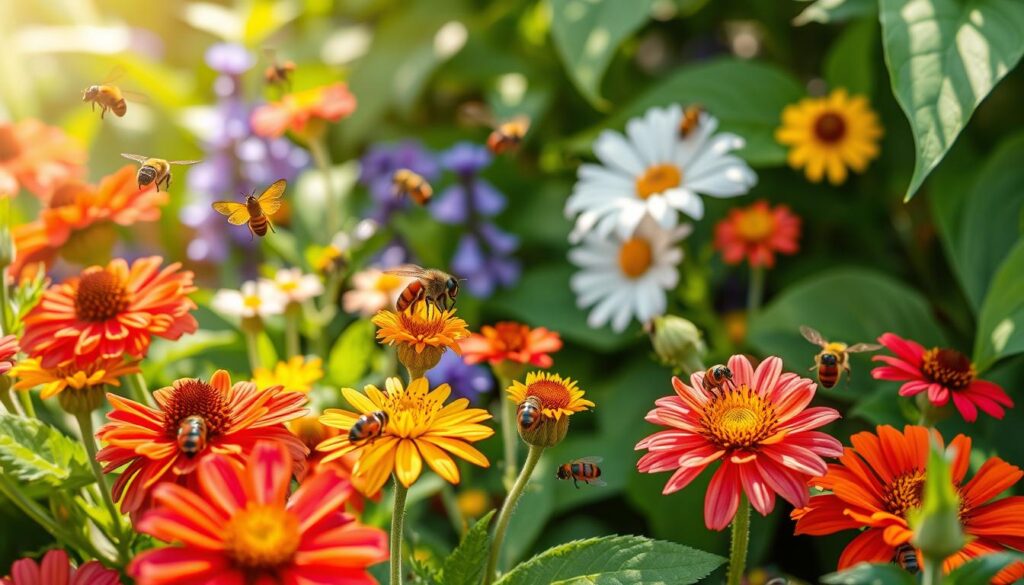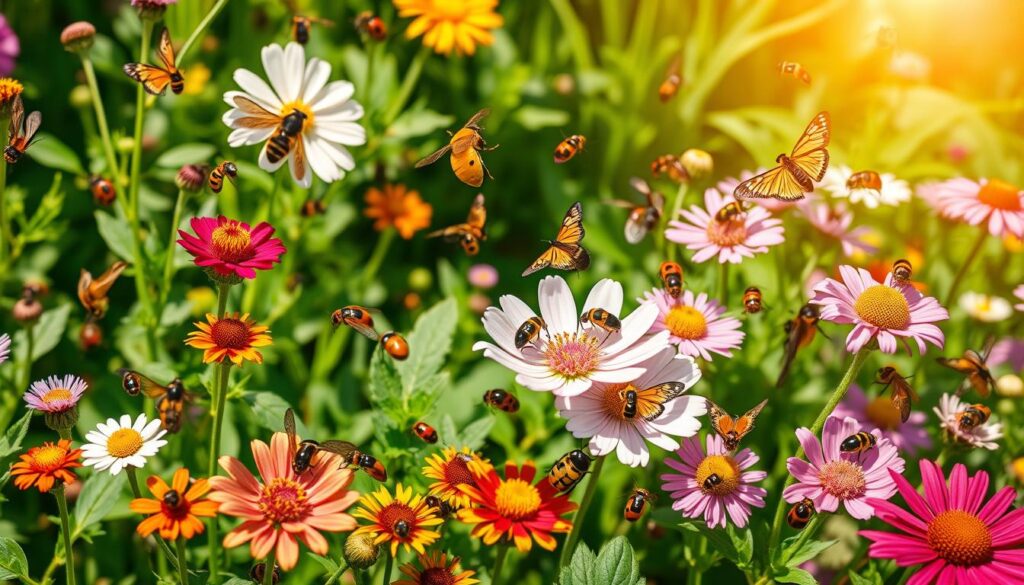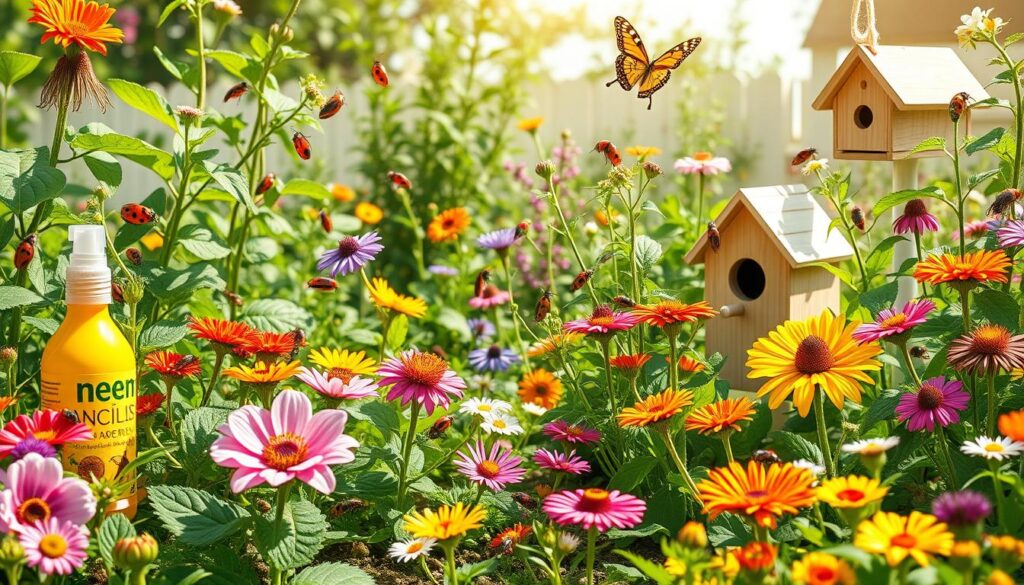Did you know that nearly 80% of flowering plants need insects to reproduce? This fact shows how important it is to rethink garden pests. Many insects are not pests but are vital to our gardens. By changing how we see them, we can value beneficial insects more and protect them better.

Understanding garden life is crucial for gardening the right way. In this article, we’ll show that not all insects are pests. We’ll talk about how to manage pests well and the important roles insects play in a healthy garden.
Key Takeaways
- Approximately 80% of flowering plants are pollinated by insects.
- Many insects, often seen as pests, contribute positively to the garden ecosystem.
- Identifying and protecting beneficial insects is essential for sustainable gardening.
- Implementing integrated pest management helps reduce harmful insects while preserving beneficial species.
- Informed gardening practices enhance both plant health and biodiversity.
Understanding the Role of Insects in the Garden Ecosystem
Insect diversity is key to a garden’s health. Different insects help gardens stay strong and vibrant. They work with plants to create a balanced space where plants can grow well.
Studies show that gardens with more insects can fight off pests and diseases better. This shows how important insects are for a garden’s health.
The Importance of Biodiversity in Gardens
Many insect species bring big benefits to gardens. They help plants make seeds and grow food. Gardens that use green practices see more insects.
This leads to a healthier garden. Some insects even control pests, cutting down on the need for harmful chemicals.
How Insects Contribute to Soil Health and Plant Growth
Insects play a big role in soil health and plant growth. Creatures like earthworms make the soil better for plants. They help plants get the nutrients they need to grow strong.
Some insects keep pests away, helping crops grow better. Gardens full of insects show how nature can help farming be better.
Identifying Beneficial Insects
Knowing the different types of beneficial insects in your garden is key for gardeners. These insects help control pests, improve plant health, and increase biodiversity. Let’s look at some common beneficial insects and what makes them special.
Common Beneficial Insects Found in Gardens
Many insects are great for gardens, helping with pest control and plant growth. Here are a few examples:
- Ladybugs: With their red bodies and black spots, ladybugs are great at fighting aphids.
- Lacewings: Their green wings hide a powerful appetite for aphids, mealybugs, and thrips.
- Parasitic Wasps: These tiny wasps lay eggs inside pest larvae, naturally reducing pest numbers.

Characteristics that Differentiate Beneficial Insects from Pests
Identifying beneficial insects from pests is crucial. Here are some key differences:
| Feature | Beneficial Insects | Pests |
|---|---|---|
| Physical Attributes | Often brightly colored or uniquely patterned | Usually dull-colored and exhibit damaging signs |
| Behavioral Habits | Predate harmful insects; promote pollination | Feed on plant materials and harm crops |
| Feeding Patterns | Consume pests or nectar | Engage in sap-sucking or leaf-chewing |
By observing your garden closely, you can get better at identifying beneficial insects. Creating a welcoming environment for these insects naturally protects your plants and supports ecological balance.
Reimagining Garden Pests: Which Insects to Protect and Why
In gardens, different insects play a key role in keeping the ecosystem balanced. Knowing which insects are natural predators helps us manage pests better. These beneficial insects not only control pests but also add to the garden’s biodiversity. It’s important to understand their role for effective pest control.
Understanding the Impact of Predatory Insects
Predatory insects like mites, spiders, and beetles are vital for garden health. They target pests, reducing the need for harmful chemicals. By adding these insects to your garden, you create a healthier space. Studies show that protecting these insects leads to gardens with fewer pests and more life.
Pollinators: The Unsung Heroes of the Garden
Pollinators like bees, butterflies, and hummingbirds are key to a garden’s health. They help plants reproduce, leading to better growth and variety. But, their numbers are declining, threatening our gardens. Gardeners must protect these pollinators to ensure their gardens thrive. Planting native flowers and providing water can help attract these vital insects.
| Insect Type | Role in the Garden | Conservation Tips |
|---|---|---|
| Predatory Mites | Control spider mites and aphids | Introduce mites into the garden; avoid pesticides |
| Lady Beetles | Consume aphids and other pests | Plant floral resources to attract them |
| Spiders | Trap and consume various pests | Provide shelter and avoid chemical treatments |
| Bees | Pollinate flowers, enhancing biodiversity | Plant native flowers and create bee habitats |
| Butterflies | Promote pollination and garden aesthetics | Avoid herbicides; plant host plants |
Natural Pest Control Methods
Keeping pests away is key to a healthy garden. Using a mix of methods helps control pests without harming good bugs. This way, the garden stays balanced and healthy.
Using Integrated Pest Management Strategies
Integrated pest management uses many tools to fight pests. It makes gardens stronger and more resilient. The main parts of this approach are:
- Crop rotation: This breaks pest cycles, cutting down on infestations.
- Encouraging beneficial insects: By choosing native plants, you attract good bugs that fight pests.
- Monitoring pest populations: Watching pests closely lets you act fast and use the right control.
Eco-Friendly Solutions for Pest Prevention
Choosing green pest control helps keep the garden safe. Organic methods are good for the planet and work well. Some top picks are:
- Neem oil: A natural pesticide that stops pests from reproducing.
- Insecticidal soaps: Soft on the environment but tough on pests like aphids and spider mites.
- Companion planting: Planting certain plants together can keep pests away and attract good bugs.

Conclusion
Looking at garden pest management again, we see how crucial beneficial insects are. They are not just part of our gardens; they are vital helpers. They keep plants healthy and soil rich. By supporting these insects, we make our gardens stronger and more productive.
Using sustainable gardening practices is essential for a healthy garden. By cutting down on harmful chemicals and using natural ways to control pests, we help our gardens. This approach not only fights pests but also makes our gardens more diverse.
Valuing every living thing in our gardens leads to better gardening. Knowing the roles of pests and beneficial insects helps us make smart choices. This way, we create gardens that are not only beautiful but also full of life. By doing this, we show our love for the environment and make gardening more rewarding.
FAQ
Why are some insects considered beneficial in gardens?
Insects like ladybugs and lacewings are key in controlling pests and pollinating plants. They keep the garden balanced, making them crucial for organic gardening and managing pests sustainably.
How can I identify common garden pests?
Spotting pests involves looking at their looks, how they eat, and the damage they do. Guides on garden insects can help tell the good from the bad.
What are some natural pest control methods I can implement?
Natural pest control includes using IPM, encouraging predators, and organic solutions like neem oil. Planting companions and rotating crops also help prevent pests without harming good bugs.
How can I attract beneficial insects to my garden?
Attract good bugs by planting a variety of flowers for nectar and pollen, like marigolds and dill. A welcoming habitat, with native plants and less pesticides, also draws them in.
What is the role of pollinators in my garden?
Pollinators like bees and butterflies are vital for plant reproduction. They move pollen, helping plants grow. Keeping them safe is key to a healthy garden.
How does insect biodiversity impact my garden?
A variety of insects makes your garden stronger against pests and diseases. They help pollinate and control pests, leading to healthier plants and better crops.
Are there any eco-friendly insect repellents I can use?
Yes, options like neem oil, essential oils, and soaps are safe for good bugs. They’re better for the planet and your garden.
What are integrated pest management (IPM) strategies?
IPM combines different methods to manage pests in a sustainable way. It uses biology, culture, physical, and chemical methods to protect your garden and the environment.
Why is it important to protect beneficial insects?
Good bugs are vital for pest control and pollination. They keep your garden healthy and productive, supporting sustainable gardening.
How can I practice eco-friendly gardening?
Eco-friendly gardening means using organic pest control, planting companions, avoiding chemicals, and encouraging insect diversity. These practices help your garden thrive sustainably.




